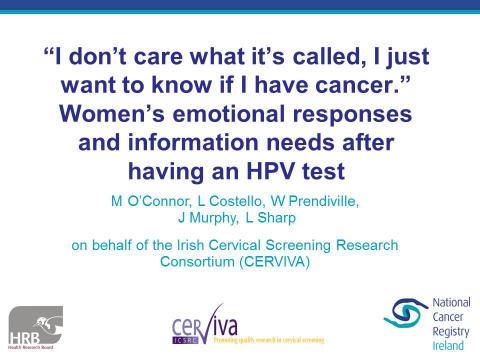Current Size: 100%
“I don’t care what it’s called, I just want to know if I have cancer.” Women’s emotional responses and information needs after having an HPV test
Aims: Testing for human papillomavirus (HPV) has recently being incorporated into several national cervical cancer screening programmes. Understanding the impact of HPV testing on women, and women’s information needs, is important to inform development of information materials. We used qualitative methods to explore emotional responses and factors influencing information needs among women undergoing HPV tests in routine clinical practice.
Methods: In-depth semi-structured interviews were conducted with 27 women who attended a colposcopy clinic and had had an HPV test performed. Interviews were transcribed verbatim, coded and analysed using framework analysis.
Results: For most women, irrespective of HPV status, having had an HPV test generated little emotional impact. Most women had concerns about their abnormal cytology results (smear test results) and these concerns overrode everything else. Their concerns surrounding their abnormal cytology also influenced their HPV information needs. A few women reported relief and reassurance after testing negative for HPV. Among the few women who did experience adverse emotional outcomes, the most common responses were shame, regret, embarrassment, anxiety, and anger. Amount of HPV-related information previously received sometimes served to increase women’s desire for further information on HPV.
Conclusions: Overall, the emotional impact of HPV testing may not be as great as previous studies have suggested. Women’s primary concerns were related to their abnormal cytology results rather than HPV. Organisers of screening programmes need to strike a balance between providing information about abnormal cytology and HPV, while ensuring that individual women receive sufficient information for their (varying) needs at appropriate times.






